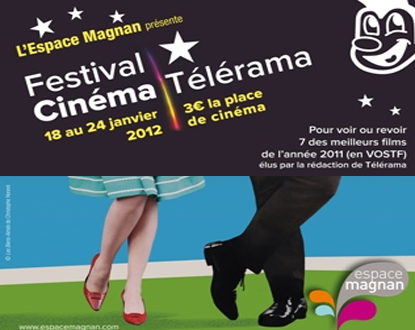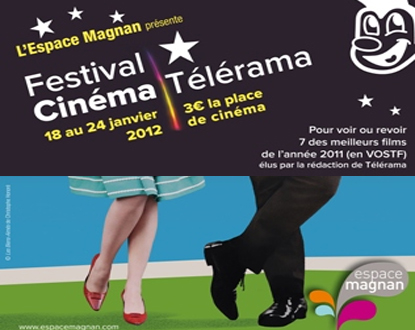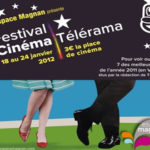The Télérama Festival, at Espace Magnan, takes place from January 18 to 24, 2012, and allows you to see or revisit 7 of the best films of 2011, selected amongst the 15 chosen by the editors of Télérama magazine.
 Haven’t seen Christophe Honoré’s moving and enchanted “Les Bien-Aimés,” Darren Aronofsky’s “Black Swan” with Oscar-winning actress Natalie Portman, Michel Piccoli and Nanni Moretti in “Habemus Papam,” the great (Cannes Film Festival Prize) “Once Upon a Time in Anatolia” by Nuri Bilge Ceylan, “The Snows of Kilimanjaro” by Guédiguian and his loyal team, “A Separation” by Ashgar Farhadi, winner of no less than 6 awards including 2 Bears (Golden Bear and Silver Bear) at the Berlin Festival and the readers’ favorite of Télérama magazine, or the tender and intelligent “Tomboy” by Céline Sciamma yet…?
Haven’t seen Christophe Honoré’s moving and enchanted “Les Bien-Aimés,” Darren Aronofsky’s “Black Swan” with Oscar-winning actress Natalie Portman, Michel Piccoli and Nanni Moretti in “Habemus Papam,” the great (Cannes Film Festival Prize) “Once Upon a Time in Anatolia” by Nuri Bilge Ceylan, “The Snows of Kilimanjaro” by Guédiguian and his loyal team, “A Separation” by Ashgar Farhadi, winner of no less than 6 awards including 2 Bears (Golden Bear and Silver Bear) at the Berlin Festival and the readers’ favorite of Télérama magazine, or the tender and intelligent “Tomboy” by Céline Sciamma yet…?
Or are you dying to watch them again on the big screen in the original version (with French subtitles)? A little patience…
It is also an opportunity to see these films with new insight, with new keys of interpretation and understanding: thanks to the intervention of cinema specialists, journalists, critics or academics, who engage in discussions around a film during an evening, to exchange with the audience, delve into an explored theme, place the film within the context of its filmmaker’s work, …
This year, Daniel Rocchia, a teacher and film critic, will focus on the Iranian film “A Separation.” As a reminder, he had already participated in the Télérama Festival at Espace Magnan in 2011 by leading the debate around the Spanish-Argentinian film “The Secret in Their Eyes” (El secreto de sus ojos) by Juan José Campanella.
And Alexandre Tylski, director of the magazine “Cadrage” and film critic (Positif, Radio France, TCM), will offer his sharp perspective on the psychological thriller “Black Swan.”
Alexandre Tylski, who is also an audiovisual teacher-researcher, author of fifteen short films, eight collections, and eighty conferences on cinema, shared with us the angle from which he hopes to approach this intense and powerful film:
“What else can be said about ‘Black Swan’ other than celebrating this complex and physical portrait of contemporary womanhood, focusing on passion (for art and for others) rather than work, on beautiful and crazy subjectivity rather than paranoia, on burning desire rather than death. An insistently declaring film: the world is in my head, and my body is in the world.”
by Sarah Bourne



